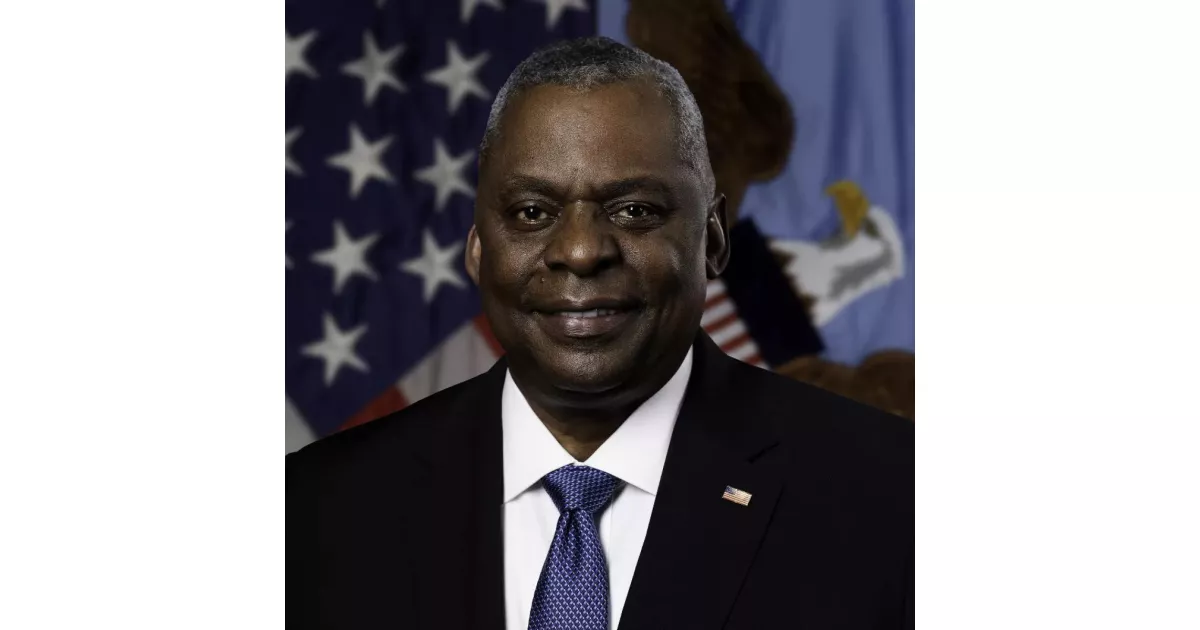1947: National Security Act Passed, Establishing Seven-Year Waiting Period
The National Security Act of 1947 was enacted, which included a provision requiring a seven-year waiting period for retired military personnel before assuming the role of Secretary of Defense.
August 8, 1953: Birth of Lloyd Austin
Lloyd James Austin III was born on August 8, 1953, in Mobile, Alabama.
June 1975: Commissioning into the Infantry and Initial Assignment in Germany
After graduating from West Point in June 1975, Lloyd Austin was commissioned as a second lieutenant in the Infantry and assigned to the 3rd Infantry Division (Mechanized) in Germany.
1975: Graduation from West Point
Lloyd Austin graduated from the United States Military Academy at West Point in 1975 with a Bachelor of Science degree.
1981: Operations Officer and Company Commander in Indianapolis
In 1981, Lloyd Austin served as the operations officer for the Army Indianapolis District Recruiting Command and later commanded a company in the Army Recruiting Battalion.
1986: Completion of Master's Degree in Counselor Education
In 1986, Lloyd Austin received a Master of Arts degree in counselor education from Auburn University's College of Education.
1989: Completion of Master's Degree in Business Management
Lloyd Austin obtained a Master of Business Administration in business management from Webster University in 1989.
1993: Return to the 82nd Airborne Division and Battalion Command
Lloyd Austin returned to the 82nd Airborne Division in 1993, where he commanded the 2nd Battalion (Airborne), 505th Infantry, and later served as G-3 for the division.
2001: Assignment as Assistant Division Commander
In 2001, Lloyd Austin was appointed as the Assistant Division Commander for Maneuver (ADC-M) for the 3rd Infantry Division (Mechanized) at Fort Stewart, Georgia.
August 2005: End of Tenure as Commanding General of 10th Mountain Division
Lloyd Austin's tenure as the Commanding General of the 10th Mountain Division concluded in August 2005.
September 2005: Chief of Staff of US Central Command
Starting in September 2005, Lloyd Austin served as the Chief of Staff of US Central Command at MacDill AFB in Tampa, Florida.
October 2006: End of Tenure as Chief of Staff of US Central Command
Lloyd Austin's time as Chief of Staff of US Central Command ended in October 2006.
December 8, 2006: Promotion to Lieutenant General and Command of XVIII Airborne Corps
On December 8, 2006, Lloyd Austin was promoted to Lieutenant General and given command of the XVIII Airborne Corps at Fort Bragg, North Carolina.
February 2008: Command of Multi-National Corps – Iraq
In February 2008, Lloyd Austin became the commander of Multi-National Corps – Iraq (MNC-I), the second-highest ranking commander in Iraq at that time.
August 2009: Director of the Joint Staff
In August 2009, Lloyd Austin transitioned from his command of XVIII Corps to become the Director of the Joint Staff. This appointment significantly increased his visibility and recognition within the military.
2009: Beau Biden Continued to Serve on Austin's Staff
Beau Biden continued his service on Austin's staff in Iraq throughout 2009.
September 1, 2010: Promotion to General and Commanding General of United States Forces – Iraq
On September 1, 2010, Lloyd Austin was promoted to the rank of General, becoming the Army's 200th four-star general officer. He also assumed command of United States Forces – Iraq (USF-I), making history as the first African American to command an entire theater of war.
September 2010: Appointment as Commander of United States Forces – Iraq
Lloyd Austin took command of United States Forces – Iraq in September 2010.
December 15, 2011: Formal Conclusion of U.S. Command in Iraq
On December 15, 2011, the U.S. command in Iraq officially concluded its mission, and the U.S. flag was lowered at a ceremony marking the end of Operation New Dawn.
December 2011: Nominated as Vice Chief of Staff of the United States Army
In December 2011, Lloyd Austin was nominated to become the Vice Chief of Staff of the United States Army.
December 18, 2011: Departure from Iraq
Lloyd Austin, along with his staff, departed Iraq on December 18, 2011, marking the end of his command of United States Forces – Iraq.
2011: Oversight of Transition and Negotiations in Iraq
Throughout 2011, Lloyd Austin played a crucial role in overseeing the transition from combat operations to stability operations in Iraq. He was heavily involved in negotiations with the Iraqi Government and advocated for a continued U.S. troop presence in the country.
January 2012: Appointment as Vice Chief of Staff of the Army
In January 2012, Lloyd Austin assumed the role of the 33rd Vice Chief of Staff of the Army.
January 31, 2012: Became Vice Chief of Staff of the United States Army
On January 31, 2012, Lloyd Austin assumed the role of Vice Chief of Staff of the United States Army, managing the Army's budget and headquarters staff.
2012: Nominated by President Obama to lead CENTCOM
In late 2012, President Obama nominated Lloyd Austin to lead CENTCOM.
March 2013: Appointment as Commander of United States Central Command
Lloyd Austin became the 12th commander of United States Central Command (CENTCOM) in March 2013.
March 22, 2013: Became Commander of CENTCOM
On March 22, 2013, Lloyd Austin took command of CENTCOM, overseeing US troops and military operations in the Middle East, Central Asia, and parts of South Asia.
2013: Advised National Leadership on CENTCOM Region Challenges
Throughout 2013, Austin consistently advised the President, Secretary of Defense, and other top leaders about challenges within the CENTCOM region and directed US and allied military responses to various crises and operations.
June 2014: Oversaw Development of Coalition Military Campaign Against ISIL
Following the ISIL's takeover of Mosul in June 2014, Austin oversaw the creation and execution of a coalition military campaign to counter ISIL in Iraq and Syria, known as Combined Joint Task Force - Operation Inherent Resolve (CJTF-OIR).
2015: Testified Before Senate Committee on Syrian Train and Equip Program
In 2015, Austin testified before the Senate Committee on Armed Services, acknowledging that a CENTCOM program designed to train Syrians to fight ISIL had produced very few fighters.
April 5, 2016: Retirement Ceremony at Joint Base Myer–Henderson Hall
Lloyd Austin's retirement ceremony took place on April 5, 2016, at Joint Base Myer–Henderson Hall, marking the end of his military career.
2016: Strengthening India-U.S. Defense Partnership and Key Agreements
In 2016, the defense partnership between India and the U.S. witnessed significant progress with the signing of crucial defense and security agreements. A notable example is the Logistics Exchange Memorandum of Agreement, which grants their respective militaries access to each other's bases for the purpose of repairs and replenishing supplies.
2016: Retirement from the Military
Lloyd Austin retired from the military in 2016 after a distinguished career.
July 2017: Iraqi Government Regained Control of Mosul
By July 2017, the Iraqi government, supported by CJTF-OIR, regained control of Mosul from ISIL.
September 18, 2017: Appointed to Nucor's Board of Directors
Austin was appointed to Nucor's board of directors on September 18, 2017.
December 2017: ISIL Lost All Control of Territory in Iraq
By December 2017, ISIL had lost all of its controlled territory in Iraq due to the ongoing efforts of CJTF-OIR and its allies.
May 29, 2018: Appointed as Independent Director on Tenet Healthcare Board
On May 29, 2018, Austin was appointed as an independent director on the board of Tenet Healthcare.
2019: Territorial Defeat of Daesh (ISIL) Achieved
In 2019, the global coalition achieved the territorial defeat of Daesh, also known as ISIL, due to the combined efforts of the Iraqi security forces and Operation Inherent Resolve partners.
January 2020: Start of Period Covered by Afghanistan Withdrawal Review
January 2020 marked the beginning of the period under scrutiny by the independent After Action Review (AAR) commissioned by Lloyd Austin. This review examined the Department of Defense's implementation of U.S. Afghanistan policy, encompassing key events and decisions leading up to the withdrawal of U.S. forces.
February 2020: Trump Administration Sets May 1 Deadline for Afghanistan Troop Withdrawal
In February 2020, the Trump administration established a deadline of May 1 for the complete withdrawal of U.S. troops from Afghanistan. This deadline was a key provision of the Doha Agreement, a peace deal negotiated between the United States and the Taliban.
October 2020: Raytheon Stock Holdings and Compensation Reported
As of October 2020, Austin's Raytheon stock holdings were valued at roughly $500,000, and his total compensation, including stock, amounted to $2.7 million.
December 7, 2020: Nomination for Secretary of Defense
On December 7, 2020, then-President-elect Joe Biden nominated Lloyd Austin for the position of Secretary of Defense.
2020: Removal of Trump Appointees from Pentagon Boards
In 2020, Austin removed a number of former President Trump's appointees from Pentagon advisory boards as part of a wider review. This included high-profile figures like Newt Gingrich and Corey Lewandowski. Many of these appointees had been appointed in the final days of Trump's presidency.
January 6, 2021: Austin Visits National Guard at Capitol
On January 6, 2021, shortly after becoming Secretary of Defense, Austin visited the National Guard stationed at the U.S. Capitol to thank them for their service in protecting the Capitol following the attack on January 6th. He also stated that the National Guard presence would be reduced in the coming weeks.
January 19, 2021: Senate Armed Services Committee Held Austin's Confirmation Hearing
The Senate Armed Services Committee conducted a confirmation hearing for Lloyd Austin's nomination as Secretary of Defense on January 19, 2021.
January 22, 2021: Lloyd Austin becomes the 28th United States Secretary of Defense
On January 22, 2021, Lloyd Austin was sworn in as the 28th United States Secretary of Defense, making him the first African American to hold this position.
January 25, 2021: Ceremonially Sworn in as Secretary of Defense by Vice President Harris
Following his confirmation, Austin was officially sworn in as Secretary of Defense by Vice President Kamala Harris on January 25, 2021.
February 5, 2021: Austin Implements New Military Training on Extremism
On February 5, 2021, motivated by concerns about right-wing extremism within the military, Austin announced mandatory training for all service members. The training would focus on the oath of office, unacceptable behavior, and reporting procedures for extremist activities.
February 15, 2021: Missile Attack Targets US Personnel in Iraq
On February 15, 2021, a missile attack targeted American personnel in Iraq. This attack resulted in the death of a civilian contractor and injuries to an American soldier. An Iranian-backed militia was believed to be responsible for this attack.
February 2021: Addressing Regional Security Concerns in the Indo-Pacific
In February 2021, Lloyd Austin, as part of the Biden administration, addressed the growing security concerns within the Indo-Pacific region. These concerns were primarily directed at China's increasing influence, particularly its military expansion during the pandemic, and North Korea's nuclear program.
February 19, 2021: Austin Reaffirms US-Saudi Security Partnership
On February 19, 2021, Austin spoke with Saudi Crown Prince Mohammed bin Salman, emphasizing the enduring nature of the US-Saudi security partnership spanning over seven decades. Austin expressed his commitment to collaborating with Saudi Arabia to achieve stability and security in the region, particularly in the context of the Iran-Saudi Arabia proxy conflict.
February 25, 2021: US Conducts Airstrikes Against Iranian-Backed Militia in Syria
On February 25, 2021, under President Biden's directive, Austin coordinated airstrikes targeting an Iranian-backed militia in Syria. These strikes were a response to earlier attacks on American personnel in Iraq, which were attributed to the militia. This militia was also believed to be responsible for an attack on February 15, 2021, that resulted in the death of a civilian contractor and injuries to an American soldier.
March 2021: First Overseas Trip as Secretary of Defense
In March 2021, Lloyd Austin embarked on his first overseas trip as the U.S. Secretary of Defense, accompanied by Secretary of State Antony Blinken. Their itinerary included visits to Japan and South Korea, reflecting the Biden administration's focus on strengthening alliances in the Indo-Pacific region.
March 2021: Austin's Three-Day Visit to India Amidst Sino-Indian Tensions
In March 2021, Lloyd Austin undertook a three-day visit to India, engaging in discussions with his Indian counterpart, Rajnath Singh, and other high-ranking government officials. This visit coincided with India's growing proximity to the United States due to heightened tensions with China along their shared border. During his visit, Austin urged India to reconsider its planned purchase of Russia's S-400 air defense system.
March 2021: Biden Directs Withdrawal Planning from Afghanistan
In March 2021, President Biden instructed his national security team, including Lloyd Austin, to commence planning for the withdrawal of U.S. troops from Afghanistan. This planning process aimed to address a range of potential scenarios, including a non-combatant evacuation operation (NEO).
March 16, 2021: Japan-U.S. Security Consultative Committee Meeting
On March 16, 2021, the Japan-U.S. Security Consultative Committee (SCC), also known as the "2+2" meeting, convened in Tokyo. Lloyd Austin and Secretary of State Antony Blinken represented the United States, while Foreign Minister Motegi Toshimitsu and Defense Minister Kishi Nobuo represented Japan. The meeting reaffirmed the enduring strength and significance of the Japan-U.S. alliance, emphasizing its crucial role in maintaining peace, security, and economic prosperity in the Indo-Pacific region.
March 21, 2021: Austin Meets with Afghan President Ashraf Ghani in Kabul
On March 21, 2021, Lloyd Austin met with Afghan President Ashraf Ghani in Kabul to discuss the ongoing situation in Afghanistan.
April 14, 2021: Biden Announces New Deadline for Afghanistan Withdrawal
In an address to the nation on April 14, 2021, President Biden announced a new deadline of September 11, 2021, for the full withdrawal of all U.S. troops from Afghanistan. This decision, he explained, was made after extensive consultations with allies, partners, military leaders, intelligence officials, diplomats, development experts, Congress, the Vice President, Afghan President Ashraf Ghani, and other world leaders. President Biden emphasized the need to end America's longest war and bring troops home.
July 24, 2021: Austin's Assessment of Afghan Military's Ability to Counter Taliban Offensive
On July 24, 2021, as the Taliban made significant territorial gains in Afghanistan, Lloyd Austin acknowledged the challenging situation faced by the Afghan military. He emphasized the importance of slowing down the Taliban's momentum as a priority.
August 12, 2021: Deployment of U.S. Troops to Kabul Airport for Evacuation Mission
On August 12, 2021, in response to the rapidly deteriorating security situation in Afghanistan and the Taliban's swift advance, the Biden administration announced the deployment of 3,000 U.S. troops to Kabul's Hamid Karzai International Airport. The primary mission of these troops was to facilitate the evacuation of embassy personnel, U.S. citizens, and Special Immigrant Visa applicants.
August 2021: End of Period Covered by Afghanistan Withdrawal Review
August 2021 marked the end of the period under review by the independent After Action Review (AAR) commissioned by Lloyd Austin. This review focused on the Department of Defense's execution of U.S. policy in Afghanistan during this critical timeframe, which witnessed significant developments, including the Taliban's takeover of Kabul.
August 26, 2021: ISIS-K Suicide Bombing at Kabul Airport
On August 26, 2021, a devastating suicide bombing occurred at Hamid Karzai International Airport in Kabul, Afghanistan. The attack, carried out by the terrorist group ISIS-K, resulted in the loss of over 170 civilian lives and 13 U.S. service members. The bombing occurred at Abbey Gate, one of the main entry points to the airport, where large crowds of people were gathered, hoping to flee Afghanistan.
August 30, 2021: Last American Service Member Leaves Afghanistan
On August 30, 2021, the final American service member departed from Afghanistan, marking the end of the U.S. military presence in the country after nearly two decades of war. This event signified the conclusion of the U.S. withdrawal from Afghanistan.
September 11, 2021: Deadline for Full U.S. Troop Withdrawal from Afghanistan
September 11, 2021, marked the deadline set by the Biden administration for the complete withdrawal of all U.S. military personnel from Afghanistan, ending America's longest war.
November 2021: Austin Reinforces US Commitment to Middle East Security
During the Manama Dialogue in Bahrain in November 2021, Austin reaffirmed the United States' dedication to security in the Middle East. He underscored the importance of partnerships, highlighting collaborative efforts to deter aggression, combat terrorism, and ensure freedom of navigation. He emphasized the ongoing commitment to strengthening these partnerships through various initiatives.
December 2021: Austin Orders Independent Review of Afghanistan Withdrawal
In December 2021, Lloyd Austin commissioned an independent After Action Review (AAR) to provide a comprehensive assessment of the Department of Defense's execution of U.S. policy in Afghanistan from January 2020 to August 2021. The review aimed to scrutinize key decision points, limitations, and assumptions to facilitate a government-wide effort to extract lessons learned and enhance the Department's responsiveness to future crises.
February 2022: Start of Ukraine Defense Contract Group Support
In February 2022, the Ukraine Defense Contract Group began committing security assistance to Ukraine, reaching over $98 billion by June 13, 2024.
February 24, 2022: Russia Invades Ukraine
On February 24, 2022, Russian President Vladimir Putin launched a "special military operation" in Ukraine. The U.S. responded by sending billions of dollars in military aid to Ukraine.
March 2022: Biden Administration Announces $1 Billion in Security Assistance to Ukraine
In March 2022, the Biden Administration announced $1 billion in security assistance for Ukraine, including direct transfers of equipment from the Defense Department to the Ukrainian military.
April 24, 2022: Austin and Blinken Visit Kyiv
On April 24, 2022, Secretary Austin and Secretary of State Antony Blinken traveled to Kyiv and met with Ukrainian leaders to discuss support for Ukraine's government and its security, governance, economic, and humanitarian needs.
June 11, 2022: Austin Condemns China's Military Activities Near Taiwan
On June 11, 2022, Lloyd Austin publicly condemned China's military activities near Taiwan, characterizing them as "provocative" and "destabilizing." This statement came a day after China's Defense Minister Wei Fenghe issued a warning to Austin, stating that any attempt to separate Taiwan from China would result in military action from the Chinese army. Austin reiterated the United States' commitment to fulfilling its obligations under the Taiwan Relations Act, which includes providing Taiwan with the necessary support to maintain a sufficient self-defense capability.
July 16, 2022: Biden Attends Jeddah Security and Development Summit
On July 16, 2022, President Biden, in collaboration with regional leaders, participated in the inaugural "Jeddah Security and Development Summit". This summit underscored the significance of the U.S.'s long-standing partnerships in the Middle East, reaffirming their commitment to security and recognizing the region's growing importance in global trade and technology.
November 2022: Previous Communication Between Austin and Chinese Counterparts
Prior to their phone call in April 2024, the last known substantial communication between Lloyd Austin and any Chinese counterpart occurred in November 2022.
2022: 2022 National Defense Strategy (NDS) Objectives Reiterated
Austin reiterated the objectives outlined in the 2022 National Defense Strategy (NDS).
January 10, 2023: Austin Addresses Iran Threat at AIPAC Forum
On January 10, 2023, at the AIPAC Political Leadership Forum, Austin reiterated his stance on Iran, emphasizing the threat posed by a potential nuclear-armed Iran. He condemned Iran's support for terrorism, its aggressive actions, and its destabilizing influence in the region and beyond, including its support of Russia. He emphasized the need for a united front to counter these threats.
January 2023: Austin Highlights Alliances at AIPAC Forum
During the AIPAC Political Leadership Forum in January 2023, Austin emphasized the critical importance of America's network of alliances and partnerships, particularly in the Middle East. He stressed that this network is a unique strength, vital for addressing challenges in the region.
January 2023: Unyielding Support for Israel's Security
In January 2023, Lloyd Austin strongly affirmed the United States' unwavering commitment to Israel's security. He emphasized that this commitment was non-negotiable and would remain a cornerstone of U.S. foreign policy.
January 2023: Juniper Oak 23.2: Historic Joint Military Exercise
January 2023 marked a significant milestone in U.S.-Israel relations with the execution of Juniper Oak 23.2, the largest joint military exercise conducted by the two nations. This extensive operation involved over 7,000 personnel and incorporated a wide array of military hardware, including unmanned aerial vehicles, strategic bombers, jet fighters, and precision fire systems.
January 20, 2023: Austin Attends Ukraine Defense Contact Group Meeting
On January 20, 2023, Secretary Austin attended the eighth meeting of the Ukraine Defense Contact Group, which resulted in a significant commitment of military aid for Ukraine, including 31 M1 Abrams tanks from the United States.
February 2023: Austin Secures U.S. Military Access to Bases in the Philippines
By February 2023, Lloyd Austin had successfully secured access for the U.S. military to nine military bases in the Philippines. This strategic move, which expedites the full implementation of the Enhanced Defense Cooperation Agreement signed during the Obama administration, positions U.S. forces between Taiwan and the South China Sea, further enhancing regional security arrangements.
February 2023: U.S.-Led Coalition Provides Over $80 Billion in Security Assistance to Ukraine
By February 2023, the U.S.-led coalition, comprising over 50 countries, had provided more than $80 billion in security assistance to Ukraine, including military equipment and training, since Russia's invasion.
March 2023: Austin Addresses Iran's Destabilizing Activities in Israel Visit
During a March 2023 visit to Israel, Austin, alongside Israeli Defense Minister Yoav Gallant, expressed serious concerns about Iran's destabilizing actions in the region. He labeled Iran as the primary source of instability and highlighted concerns related to terrorism, nuclear advancements, maritime aggression, cyber threats, and weapons proliferation.
March 28, 2023: Testified Before Senate on DoD Budget Request
On March 28, 2023, Austin appeared before the Senate Armed Services Committee to provide testimony on the Department of Defense's Budget Request for Fiscal Year 2024 and the Future Years Defense Program.
March 29, 2023: Addressing the Challenge Posed by China
On March 29, 2023, during his testimony before the House Armed Services Committee, Lloyd Austin identified China as the most significant challenge facing the United States. He outlined the Defense Department's strategy for deterring Chinese aggression, which involved strengthening military capabilities, enhancing partnerships, and bolstering the U.S. presence in the Indo-Pacific region.
May 2023: Austin Defends Refusal to Cooperate with ICC Investigation into Russian War Crimes
During a Senate hearing in May 2023, Secretary Austin defended the Biden administration's decision not to cooperate with the International Criminal Court's investigation into Russian war crimes in Ukraine. Austin stated that he prioritized protecting U.S. military personnel.
May 25, 2023: Austin Hosts 12th Meeting of the UDCG
Secretary Austin hosted the 12th meeting of the Ukraine Defense Contact Group, held virtually with leaders from 50 countries, on May 25, 2023, where they pledged further support for Ukraine's fight for freedom.
June 15, 2023: Austin Announces New Security Assistance Package for Ukraine at UDCG Meeting
On June 15, 2023, at the 13th meeting of the UDCG, Secretary Austin announced a new security assistance package for Ukraine exceeding $2 billion under the Ukraine Security Assistance Initiative.
June 2023: Austin's Seventh Official Visit to the Indo-Pacific Region
In June 2023, Lloyd Austin embarked on his seventh official visit to the Indo-Pacific region. During this trip, he traveled to Tokyo to meet with key Japanese officials, including Defense Minister Yasukazu Hamada, Prime Minister Kishida Fumio, and Foreign Minister Yoshimasa Hayashi. The visit aimed to further modernize the U.S.-Japan alliance, optimize U.S. force posture, and strengthen ties with like-minded partners following the significant U.S.-Japan "2+2" Ministerial meeting earlier that year.
June 2023: Austin's Second Visit to India to Strengthen U.S.-India Defense Partnership
In June 2023, Lloyd Austin made his second visit to India, where he once again met with Defense Minister Rajnath Singh and other prominent leaders. The discussions centered around the ongoing collaborative efforts to modernize the U.S.-India Major Defense Partnership.
July 2023: Austin Participates in the 33rd Australia/U.S. Ministerial Consultations (AUSMIN)
In July 2023, Lloyd Austin traveled to Australia to participate in the 33rd Australia/U.S. ministerial consultations, known as AUSMIN. Following the meeting, Department of Defense officials emphasized the strength of the U.S.-Australia alliance, stating that it had never been stronger and was playing a crucial role in maintaining peace and stability in the Indo-Pacific region.
September 2023: First Trip to Africa as Secretary of Defense
In September 2023, Lloyd Austin embarked on his inaugural trip to Africa as the U.S. Secretary of Defense. His journey commenced in Djibouti, where he engaged in discussions with President Ismaïl Omar Guelleh and Somali President Hassan Sheikh Mohamud at Camp Lemonnier, the primary U.S. military base in Africa. Proceeding to Kenya, he solidified a five-year security agreement alongside Kenyan Defense Minister Aden Duale, aimed at strengthening collaborative efforts against shared terrorist threats. Furthermore, Austin pledged $100 million to bolster Kenyan security deployments in anticipation of their leadership in a multinational peacekeeping mission to Haiti, targeting gang violence. Concluding his African tour, he made history as the first U.S. Secretary of Defense to visit Angola, underscoring the significance of the region in U.S. foreign policy.
September 19, 2023: Austin Discusses Long-Term Security Commitments to Ukraine at UDCG Meeting
During the 15th meeting of the Ukraine Defense Contact Group on September 19, 2023, Secretary Austin discussed long-term security commitments and arrangements to support Ukraine's future security.
November 13, 2023: Lawsuit Alleging Failure to Prevent Genocide
On November 13, 2023, a lawsuit was filed against Lloyd Austin, President Joe Biden, and Secretary of State Antony Blinken. The plaintiffs, including Defence for Children International, Al-Haq, and Palestinian residents of Gaza and the U.S., alleged that the defendants failed to prevent genocide in Gaza. The lawsuit cited Israel's actions, including "mass killings," targeting civilian infrastructure, collective punishment tactics, and the imposition of a siege that severely restricted essential supplies to Gaza.
November 2023: Austin Attends ASEAN Defense Ministers' Meeting-Plus in Jakarta
In November 2023, Lloyd Austin traveled to Jakarta, Indonesia, to participate in the ASEAN Defense Ministers' Meeting-Plus (ADMM-Plus). During the meeting, he emphasized the United States' unwavering commitment to ASEAN centrality as a cornerstone of its efforts to maintain a free and open Indo-Pacific region. Austin also outlined how U.S. security cooperation with ASEAN partners contributes to a more stable and prosperous region. On the sidelines of the ADMM-Plus, he held individual meetings with his counterparts from the Philippines, Indonesia, Thailand, and Vietnam.
November 2023: Congressional Approval of Military Aid to Israel
In November 2023, the U.S. House of Representatives demonstrated its strong support for Israel by approving $14.5 billion in military aid. This move followed the Biden administration's announcement that it would seek an unprecedented support package for Israel's defense, amounting to $14.3 billion.
November 20, 2023: Austin Visits Ukraine, Announces New Security Assistance Package
Secretary Austin made an unannounced visit to Ukraine on November 20, 2023, his third as defense secretary, where he met with President Zelenskyy and Defense Minister Rustem Umerov. During the visit, Austin announced a new $100 million security assistance package for Ukraine.
November 28, 2023: Humanitarian Airlift to Gaza
On November 28, 2023, the U.S. showed its commitment to humanitarian relief by airlifting 24.5 metric tons (over 54,000 pounds) of U.N. humanitarian aid to the people of Gaza. This operation involved a U.S. Air Force C-17 Globemaster aircraft transporting the aid to Egypt, where it was then delivered to Gaza by ground and distributed by U.N. agencies.
December 2, 2023: Reiteration of Unwavering Support for Israel
On December 2, 2023, Lloyd Austin reiterated the United States' unwavering commitment to Israel's security. He stressed that the U.S. considered its support for Israel non-negotiable, reflecting the strong bond between the two nations.
December 2023: Approval of Military Equipment Sale to Israel
In December 2023, the Biden administration took the significant step of bypassing Congress to approve the sale of military equipment to Israel. This decision highlighted the administration's prioritization of Israel's security needs.
December 18, 2023: Establishment of Operation Prosperity Guardian
On December 18, 2023, Lloyd Austin announced the establishment of Operation Prosperity Guardian, a multinational maritime task force. This initiative aimed to address the increasing attacks by Houthis in Yemen on commercial ships and other targets in the region. The Pentagon reported over 100 drone and ballistic missile attacks by Houthis, targeting vessels from 35 nations.
December 22, 2023: Austin Undergoes Prostate Cancer Surgery
On December 22, 2023, Austin underwent a minimally invasive surgical procedure to address his prostate cancer.
December 27, 2023: U.S. Announces Additional $250 Million in Security Assistance for Ukraine
On December 27, 2023, the United States announced a $250 million package of security assistance for Ukraine, including air defense systems, ammunition, and medical equipment.
January 1, 2024: Austin Hospitalized at Walter Reed
On January 1, 2024, Austin was hospitalized at Walter Reed National Military Medical Center due to complications from a surgery related to his prostate cancer treatment he received on December 22, 2023.
January 31, 2024: Dismissal of Genocide Prevention Lawsuit
On January 31, 2024, the lawsuit against Lloyd Austin, President Biden, and Secretary of State Blinken, which alleged their failure to prevent genocide in Gaza, was dismissed. The court determined that while the allegations against Israel's conduct were serious, U.S. foreign policy decisions fell under political questions, placing them outside the court's jurisdiction.
February 2024: Physical Presence and Demeanor
As of February 2024, Lloyd Austin is described as having a "towering presence," standing well over six feet tall and weighing over 250 pounds. Despite his imposing physique, he is known for his reserved nature and preference for maintaining a low public profile.
February 23, 2024: Statement on Two Years of Russian Invasion of Ukraine
On February 23, 2024, U.S. Secretary of Defense Lloyd Austin issued a statement acknowledging the commitment of the 50 countries that make up the Ukraine Defense Contact Group in supporting Ukraine in the face of the Russian invasion. He highlighted the significant financial contribution made by the coalition, exceeding $87 billion in security assistance to Ukraine since the war began.
February 29, 2024: Austin Testifies Before House Armed Services Committee
On February 29, 2024, Austin appeared before the House Armed Services Committee to address his recent hospitalization. He took responsibility for not handling communication about his illness properly, but emphasized that there was no disruption to the chain of command or national security.
March 5, 2024: Meeting with Israeli War Cabinet Member Benny Gantz
On March 5, 2024, Lloyd Austin held a meeting with Israeli War Cabinet Member Benny Gantz. During this meeting, Austin strongly condemned Hamas's attack on Israel, which had occurred on October 7 of the previous year. He also expressed serious concerns regarding the dire humanitarian situation in Gaza and urged Minister Gantz to facilitate increased humanitarian assistance and its effective distribution within Gaza.
March 8, 2024: Establishment of a Temporary Pier in Gaza for Humanitarian Aid Delivery
On March 8, 2024, the Defense Department announced its plan to build a temporary pier on the Gaza coast to facilitate the delivery of humanitarian aid, with a goal of providing up to 2,000,000 meals per day.
April 9, 2024: Testimony on the Situation in Gaza
On April 9, 2024, Lloyd Austin, while testifying before the Senate Armed Services Committee, stated that the Pentagon had found no evidence to support the allegations of Israel committing genocide against Palestinians in the Gaza Strip. He did acknowledge the tragic loss of civilian lives during the conflict in Gaza, characterizing the number of civilian casualties as "far too many."
April 15, 2024: Marked 10 Years of Global Coalition Against ISIL
On April 15, 2024, Secretary Austin commemorated the 10th anniversary of the global coalition formed to combat ISIL while hosting Iraqi Prime Minister Mohammed Shia al-Sudani at the Pentagon.
April 16, 2024: First Phone Call Between Austin and Chinese Defense Minister Dong Jun
On April 16, 2024, Lloyd Austin engaged in a phone conversation with Admiral Dong Jun, the Minister of National Defense of the People's Republic of China (PRC). This marked the first instance of direct communication between Austin and Dong and the first substantial exchange between Austin and any Chinese counterpart since November 2022.
May 31, 2024: Austin and Dong Jun Meet in Singapore After 18-Month Hiatus
On May 31, 2024, Lloyd Austin and his Chinese counterpart, Dong Jun, held a meeting in Singapore on the sidelines of the Shangri-La Dialogue. This encounter ended an 18-month period without in-person discussions between the two countries' top defense officials. During their meeting, Austin expressed concerns about recent provocative activities by the People's Liberation Army (PLA) around the Taiwan Strait and emphasized that China should not exploit Taiwan's political transition, a normal democratic process, as a pretext for coercive actions. Austin reiterated the U.S. commitment to its longstanding one-China policy and underscored the importance of preserving peace and stability across the Taiwan Strait.
June 2, 2024: Meeting with Ukrainian President Volodymyr Zelenskyy
On June 2, 2024, during the Shangri-La Dialogue in Singapore, U.S. Secretary of Defense Lloyd Austin met with Ukrainian President Volodymyr Zelenskyy. They discussed strengthening the strategic defense partnership between their countries and reiterated the United States' unwavering support for Ukraine against Russian aggression.
June 13, 2024: Ukraine Defense Contract Group Meeting
On June 13, 2024, the 23rd meeting of the Ukraine Defense Contract Group took place in Brussels, Belgium. U.S. Secretary of Defense Lloyd Austin and Ukrainian Defense Minister Rustem Umerov co-hosted the event. Austin announced that the group had committed over $98 billion in security assistance to Ukraine since February 2022. He emphasized the coalition's ongoing efforts to provide essential capabilities to meet Ukraine's urgent needs.
2024: Department of Defense Fiscal Year 2024 Budget Request
In 2024, the Department of Defense submitted its budget request for the fiscal year 2024.
2024: DoD Budget Request for Fiscal Year 2024
The Department of Defense submitted its Budget Request for Fiscal Year 2024.
Mentioned in this timeline

Vladimir Vladimirovich Putin is a Russian politician and former intelligence...
Ukraine is a large country in Eastern Europe second in...

Joe Biden a member of the Democratic Party served as...

Kamala Devi Harris is an American politician and attorney notable...
Saudi Arabia officially the Kingdom of Saudi Arabia KSA is...

Antony John Blinken is an American diplomat and lawyer He...
Trending

9 months ago Gavin Newsom faces challenges in final term amid budget concerns and 2028 ambitions.

Gus Bradley is an American football coach currently serving as the defensive coordinator for the Indianapolis Colts He gained recognition...

Tua Tagovailoa is an American football quarterback currently playing for the Miami Dolphins in the NFL He gained prominence during...

Collin Sexton nicknamed the Young Bull is an American professional basketball player currently with the Utah Jazz He played college...
2 months ago Saddiq Bey Shines with High Scores and Impressive Highlights in Recent Games

8 months ago Randy Travis and Wife Invest in Jackson's Metrocenter Mall Revitalization Project.
Popular

Thomas Douglas Homan is an American law enforcement officer who...

William Franklin Graham III commonly known as Franklin Graham is...

Melania Trump a Slovenian-American former model has served as First...

Jupiter is the fifth and largest planet from the Sun...

XXXTentacion born Jahseh Dwayne Ricardo Onfroy was a controversial yet...

Instagram is a photo and video-sharing social networking service owned...
